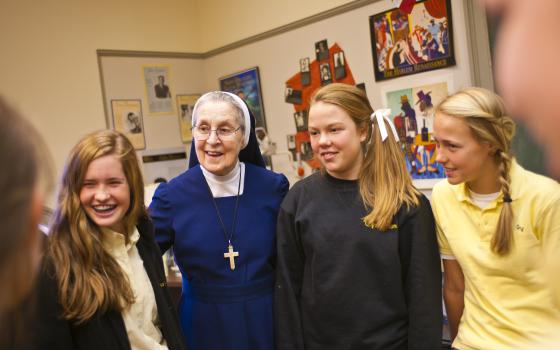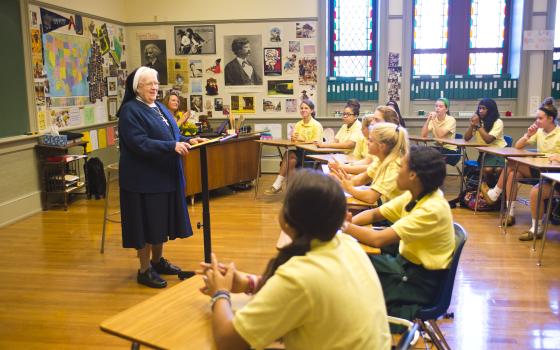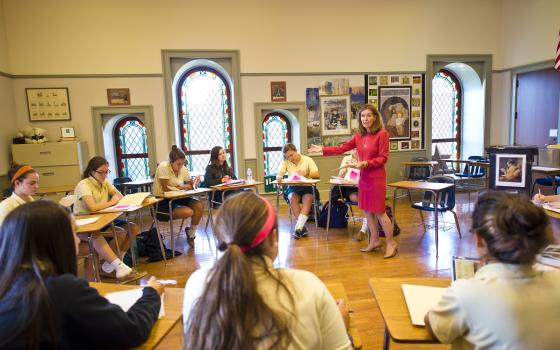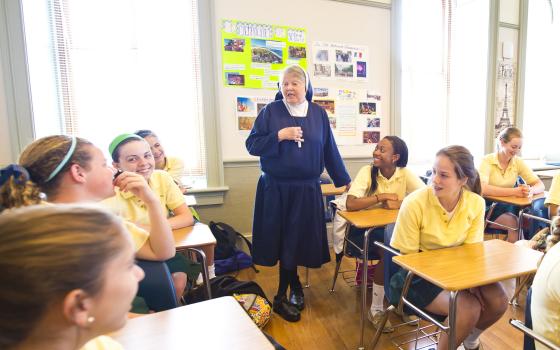Every weekday morning before class begins, Laurie Quirk, chairwoman of the English Department at Georgetown Visitation Preparatory School, waits for students — sometimes three, sometimes 30 — to show up to share a brief prayer service enriched by the words of St. Francis de Sales and Jane de Chantal, co-founders of the Visitation order.
"That was my way of bringing into the school in a lay fashion a taste of the sisters' life," says Quirk. "Even if students don't come, they know it is happening."
Quirk is a member of the Salesian Ministry Team at the secondary school, the group charged with integrating and promoting knowledge and behavior rooted in the legacy of the two saints and the work of the order that has carried on their mission.
The weekday prayer service is just one way the school passes on the commonsense Salesian virtues to its 500 students, all girls. They, the alumnae and their families are entrusted to model the Visitation charism developed at a school founded in 1799, the oldest one for Catholic girls in the original 13 states.
With the monastery situated on the school campus, the nuns of Visitation have long been integral to the daily rhythm of life at Visitation. But like other orders in recent decades, the congregation here has purposefully created programs that make it possible for teachers and other professionals to understand and appreciate the central tenets of the Salesian charism, introducing them to new generations of students.
At Georgetown Visitation, the focus on equipping laypeople has taken the form of training faculty, holding numerous student retreats and highlighting reflections on Salesian themes at school Masses and on the website. Programs for parents, for example, include opportunities for group devotions, social and service gatherings throughout the year, and a newly instituted Salesian leadership program for men and a Salesian Friends group.
The school, set among the picturesque, multimillion-dollar townhouses in Georgetown, draws students from D.C., Maryland and Virginia. Tuition approaches $30,000 a year, while about $2 million in annual financial aid is awarded.
Known for his emphasis on moderation and practicality, Francis de Sales, a member of the "lesser nobility," was known as a reformer, an advocate for an informed faith (he was spiritual director to many) and an open rather than confrontational approach to a world that in his time was rapidly changing, according to The Visitation: A Monastic Way of Life in the Church.
"All are welcome. Everybody has a gift to bring to the table," is the way Olivia Wills Kane, who heads the St. Jane de Chantal Salesian Center, describes the accessible approach of De Sales and De Chantal. "Finding the extraordinary in the ordinary is what makes it such a flexible spirituality. Everyone can find themselves in it."
For adolescent girls, who often struggle with a sense of self-esteem or wanting to fit in, De Sales' advice to be who they are and find their own gifts is particularly appropriate, she says.
Ashley Nguyen, a sophomore, said, if called upon to give a talk on the "little virtues" of St. Francis de Sales, which include humility, simplicity and kindness, she would share "my own experience with how that virtue was given to me by other people, or how I showed it to other people. I want to talk about how that virtue applies to daily life and how you can use it."
Because seniors, alums and parents are asked to participate in sharing reflections, there's a good chance that Ashley will be asked to present one on Salesian spirituality at the all-girls school sometime in the future.
"The way we interact with each other, it's like we are all friends," says Ashley. "Each class has its own kind of spirit, but it all adds to the school."
Passing on the Salesian spirit
Head of school Dan Kerns is responsible for overall supervision and fundraising, while the principal supervises the day-to-day operations. When Kerns arrived 40 years ago as a soccer coach, there were approximately 30 sisters in the monastery. Though "that has changed," he says, "what has evolved and emerged is a Salesian spirituality as a gift that the sisters want to bestow and carry on … in a very robust way."
Caroline Handorf, director of communications, says she's seen a change in the way the Salesian charism is manifested at the school since she graduated in 1996*. "There wasn't that intentionality about the spirituality before. The little virtues may seem simple. Cultivating them is a life's work."
In 1988, the Georgetown community helped form the Visitation Salesian Network, which assists the four remaining Visitation schools (including one elementary school) in the East Coast and Midwest to work collaboratively to continue their ministry of educating young women. Schools are now assessed every five to seven years to see how well they are incorporating Salesian spirituality into the life of the institution, says Sr. Mary Berchmans Hannan, former headmistress and president emerita. But even that process is oriented towards mutual learning, rather than by fiat, she says.
The school has also nurtured a relationship with the Oblates of St. Francis de Sales, who share a kindred spirituality and history. Visitation chaplain and director of campus ministry Fr. Patrick Kifolo is a member of the Wilmington-Philadelphia Province of the order.
One tangible mark of the Georgetown sisters' concern for the future was the opening of the St. Jane de Chantal Salesian Center in May of 2016, housed on the fourth floor of Founder's Hall.
The center, which works collaboratively with other departments and the sisters themselves, produces faith-focused materials for classroom use, promotes Salesian spirituality inside and outside the school, and houses archival papers and other historical objects. "So much of my work at the Salesian Center is to support people from the ground up with a robust menu of retreats, liturgies and sacramental opportunities," Kane says.
New faculty are instructed in Salesian spirituality at orientation, receive a guide on that topic from the Salesian Center, and have multiple chances to experience it in faculty meetings and other community groups, Handorf says.
All students are required to complete 80 hours of Christian service before graduating. The school sponsors dozens of service projects across the country and abroad, including an annual summer trip.
Like the nuns at Georgetown Visitation, other congregations have met the challenge of having fewer sisters on campus with a far-sighted determination to see the values and spirituality they have long championed endure.
In 1851, the Dominican sisters founded St. Agnes Academy, a school for girls, in Memphis, Tennessee. Now there are no resident sisters at St. Agnes-St. Dominic School (a boy's elementary school opened in 1957). More than a decade ago, the Dominican Sisters of Peace, who operated the school, sold it to an independent board, says Gretchen Kirk, director of religious studies. Dominican associates among the staff and parents carry on the traditions, says Kirk.
The Dominican sisters are sponsors of the school and three of them serve on the 22-member board of trustees. Sr. Anne Keenan, co-director of their Office of Founded Ministries, writes in an email that, through this work, the sisters promote their charism and Catholic identity in all educational efforts. "The sisters safeguard and cherish the mission of the school," she writes.
Of the six girls schools operated by the Sisters of St. Joseph Brentwood (five in the New York City area and one in Puerto Rico), four are lay-led, says order president Sr. Helen Kearney. While sisters volunteer at all the schools, few still serve as administrators or teachers.
"We try to pass on our story and what the mission looks like now," says Kearney. Representatives from all six schools gather annually to plan student programs, convocations and service projects, including visits to the motherhouse on Long Island. Push a button on a student, she says mischievously, and they will be able to recite the order's core values: "inclusive love, unity and reconciliation."
A presence on campus
To generations of young women at Georgetown Visitation (informally known as "Visi"), Berchmans has been the personification of the Salesian charism. Now in her mid-80s, the former headmistress, president emerita and 1948 Visitation alumna, is very much a presence on campus, attending or running meetings or, less formally, bustling around sharing cake to celebrate a sister's birthday, says Handorf.
A young woman in her 30s when she became headmistress in 1969, she is disarmingly candid about the disciplinary challenges she handled in the social turbulence of that era, in addition to escapades in which girls crept out to visit boys in another local academy. In 1975, she and her team closed the residential dormitories, and Georgetown Visitation became day-only. At that age, says Berchmans, girls need to be at home with their parents.
Berchmans, who retired in 2007, says she was guided by advice she got when about to launch her career. " 'Sister, you've got to decide right now whether you want your school to be punitive or redemptive.' I chose redemptive. It was messy sometimes, but I thought it was important."
She headed the fundraising effort that rebuilt the main classroom building, Founder's Hall, in the space of two years after it was destroyed by a 1993 fire.
Now, she says wryly of the capacious monastery where 15 sisters live: "I'm running a nursing home over there." In 1969, there were 14 sisters teaching in the classrooms and "people picked up the spirit by osmosis," she says. Today, apart from the five, including Berchmans, who have homerooms, there are none.
In their more than 200-year history in the United States, the nuns of Visitation have adapted to seismic change more than once.
When three "pious ladies" launched, in 1799, what became the American branch of the Visitation order in the nation's new capital of Washington, D.C., the revolutionary turmoil in France meant that they didn't have either explicit instructions or a sponsoring monastery. Surmounting widespread anti-Catholic prejudice, they opened a school for poor children as well as the one for paying students that eventually became Georgetown Visitation Prep. Later, the order established monasteries in other parts of the country and schools in 11 states.
In the early years of her tenure, given their physical presence at the school, the sisters weren't as intentional in making Salesian spirituality explicit in and outside the classroom, says Berchmans. But, over time, faculty and administrators have made a commitment to incorporating it into their teaching and extracurricular activities.
"It's such a commonsense approach, you can read a text from the 17th century and think it's from three years ago," says school principal Mary Kate Blaine, adding, "We're preparing them for a future none of us can see."
In "Loving Life, Living Jesus" reflections linked on the school website, current students, alumnae, parents and faculty share their own Salesian perspectives.
"Of ourselves we are nothing; all that we have and all that we are come from God," wrote Francis de Sales.
Reflecting on this quote last fall, senior Elizabeth Shumaker told students gathering at an All Saints Day Mass: "We should be thankful for not only the good things, but for everything. Thankful for the C minus we got on our math quiz. Thankful for the coffee we spilled on our skirt this morning. Thankful for the argument we got into with our parents last night. Because what if the only things you have tomorrow are the things you thanked God for today?"
The multiple approaches to Salesian spirituality taken at the school are the legacy of the sisters, many of whom are buried in the two graveyards and a crypt on campus.
"The world has changed tremendously in these 200 years and we've had to change with it to educate young women to change the world when they leave here," says Berchmans. "We're not a little oasis." The mission of the school that three intrepid women started when the country itself was young, she says "is being carried on beautifully right now."
*An earlier version of this story gave the incorrect graduation year.
[Elizabeth Eisenstadt Evans is a religion columnist for Lancaster Newspapers, Inc., as well as a freelance writer.]




